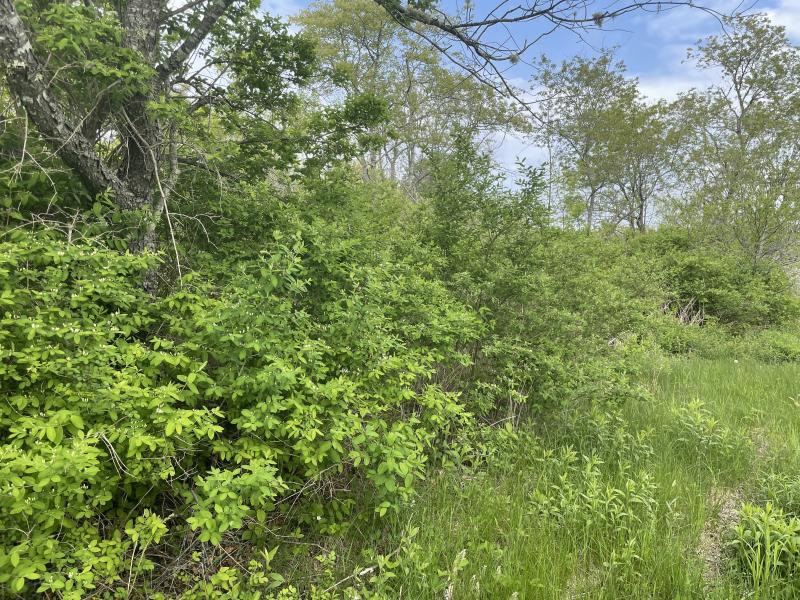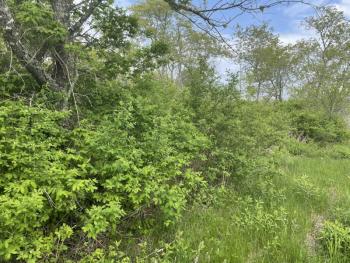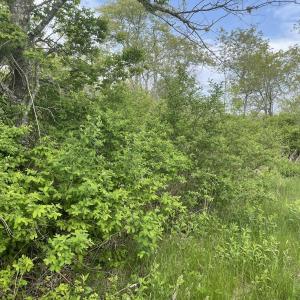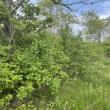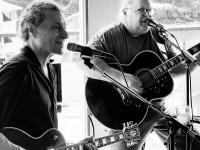BRLT seeks volunteer support to protect native wildlife
Invasive plants are a threat to the native ecosystems of coastal Maine including Boothbay Region Land Trust preserves. In the absence of pests that would normally keep them in check in their native range, they are able to spread rapidly in their new environment. Once established they reduce native plant diversity by competing for resources like sunlight, water, and nutrients. Boothbay Region Land Trust (BRLT) is working to establish mitigation plans to better limit the spread of invasive plants on the preserves. Currently, BRLT preserves have varying levels of invasive plant growth. Locations such as Porter and Ocean Point have relatively few invasive plants, while Ovens Mouth and Penny Lake have well established and widespread infestations.
The first step in BRLT’s long-term mitigation plan is to identify the problem areas where infestations are occurring, and document the extent of the invasion. From there the work can be prioritized. Early detection and rapid response (EDRR) is a key tenet of invasive species management and will be important for the long term management of invasive plants on land trust properties. EDRR focuses on identifying invasive plants, and eradicating them before they become well established, thus saving time and effort in the long run.
Unfortunately, some infestations on preserves have grown beyond the “early detection rapid response” phase. One such area contains a rather nasty infestation of burning bush and oriental bittersweet at Ovens Mouth East. Currently covering nearly 5 acres, the infestation has significantly altered the ecology and the problem is only getting worse. The burning bush and bittersweet have grown extremely dense and are crowding out virtually all the native plants living beneath including the next generation of overstory trees such as red oak and white pine.
Last summer BRLT created invasive plant maps for Ovens Mouth, which document the type and spread of invasive plants there, and this summer the land trust will begin to restore the invaded area. A variety of methods will be used including pulling and chemical treatments. These treatments will be applied by land’s manager, Brad Weigel, who completed exams and licensing through the state during the winter months in preparation for this work. Larger shrubs will be cut and the stumps treated with herbicide, while smaller seedlings and re-sprouted stumps will individually foliar sprayed. This work involves a great deal of precision in order to avoid harming existing native vegetation. Pulling will also be an important component as well particularly for isolated shrubs and vines near the periphery or outside of the main infestation.
At Penny Lake work will begin with invasive pulling. BRLT is developing a volunteer group who will meet every other week to support this on-going effort. No prior knowledge or experience with invasive plant identification is necessary. Volunteer efforts will begin at Penny Lake helping to eradicate invasive shrubs and vines including bush honeysuckle, oriental bittersweet, multi flora rose, autumn olive, and Japanese barberry. The work will consist of pulling, cutting, and piling invasive brush that will be chipped or burned later. Training on species ID and techniques for removal will be provided.
The group will initially meet at the Penny Lake parking lot/kiosk behind the Carousel Theater on June 9 between 9 a.m. and noon and will continue to meet every other Wednesday at the same time and location throughout the summer. BRLT’s event calendar will provide weekly updates if there is a change in location or cancellation due to weather and volunteers are encouraged check the website for information. Some tools will be available, but interested participants are encouraged to bring their favorite pruning shears, loppers, pulling or cutting device if possible. Long pants, long sleeve shirt, and gloves are recommended as well as bug spray and water. Further questions can be directed to Brad Weigel at bweigel@bbrlt.org
With your support BRLT’s preserved lands will be better protected for native plants and the wildlife that depends upon them.
Event Date
Address
United States

